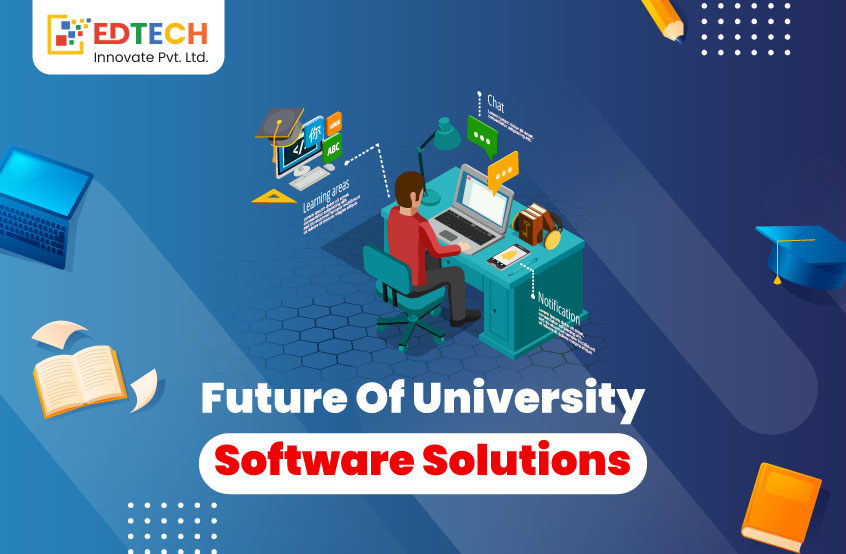Within an educational institution, there are various activities and operations conducted related to admissions, administration, communication, academic management, and the conduct and administration of exams. An academic institution ensures that these activities and operations are conducted in an accurate and timely manner to offer a seamless educational experience to its students. As the latest developments in the technology sector advance, we can see the implementation of various software tools and technologies in the field of education. These tools are introduced to streamline the education process and for better management of resources within the institution. In this blog, we will cover these software and their future scope in detail.
University Software Solutions
- Admission Management System (AMS) - An admission management system aims to improve the efficiency of online admission processes of institutions through automation. AMS software promotes the institution's overall growth by improving its operational effectiveness in enrollment-related processes. Admission management system software is employed for providing students secure access to the online application portal, handling queries of candidates, organizing and managing the submission of applications and supporting documentation, integrating social media platforms for student interaction, implementing a payment management system for the collection of fees and generating fee statements, monitoring admission status, and responding to inquiries from students.
- Enterprise Resource Planning (ERP) - ERP is the process of organizing, monitoring, communicating, and simplifying an organization's academic and administrative operations. An automated ERP software solution is essential in supporting educational institutions by providing a digital platform that is specifically designed to meet the needs of educational institutions by consolidating and digitizing various administrative tasks. It functions as a single, central point for managing staff and students, organizing exams, maintaining track of fees, and other related activities. This reduces time and money consumption for institutions and ensures the most efficient use of available resources. An online ERP portal improves user communication by strengthening the connections between learners and educators. ERP software enables organizations to function more strategically and economically to boost productivity and promote institutional growth.
- Customer Relationship Management (CRM) - An Education CRM is an automated software that helps in sales, marketing, operations, and management for educational institutions to increase enrollment of prospective students and effective communication between current students and educators. Customer Relationship Management software collects and analyses the data of students from various sources, and enables effective communication with them through multi-channel communication (SMS, WhatsApp, E-mail, etc.). The embedded sales management dashboard aids the sales team in prioritizing leads based on their lead score and the user management system defines the role-based access of the software and secure management of students' data. The automated Payment Management system enables in automation of fee reminders through late fee notifications. An effective education CRM facilitates smooth communication of educational institutions with students and converts leads into enrollment, thus maximizing the productivity and growth of the institution.
- Learning Management System (LMS) - A Learning Management System is a software tool that allows users to create, organize, upload, manage, deliver, and track the course materials including curriculum, timetable, exams, and assignments to the students digitally. LMS software helps in efficient training management through its’ centralized learning platform that can be integrated with various social media tools and ensures the integrity and reliability of stored information through robust security measures. LMS software proves to be highly beneficial for online students as LMS provides a user-friendly and modern learning ecosystem through which the students can learn and track their progress through various innovative and easily comprehensible learning resources such as e-books, gamification, e-library, and skills and certification tracking tools.
- Online Examination Portal - The Online Examination Portal is a tool that facilitates the online conduction of institutions’ examinations for students for which they can appear from anywhere, eliminating the need to give tests in classroom settings or test centers. Through an online examination portal, schools and universities can organize, schedule, conduct, and administer the entire examination process with a live proctoring system and cheating-prevention mechanisms. Institutions have access to integrate this online examination portal with LMS software to publish the results of online exams to the students on their user dashboards.
Also Read- Growth Of Universities Through Admission Management System Software
Future Scope
- AI and Machine Learning - These software tools will utilize technologies such as machine learning and artificial intelligence that will play a crucial role in better analysis and decision-making processes.
- Customized Education Programs - Students will have access to customizing their learning experiences with adaptive learning algorithms that will adjust their academic careers based on each student's unique learning style, skills, and weaknesses.
- Blockchain - Blockchain is a reliable and secure technology that will help in securely storing and verifying academic credentials, certificates, and transcripts.
- Virtual and Augmented Reality - Students’ educational experience will be enhanced through the implementation of Virtual and Augmented Reality technologies. It would help students to learn by immersing themselves in an almost surreal environment.
- Improved Data Privacy and Security - University software solutions will put great importance on robust cybersecurity measures and data privacy safeguards including multi-factor authentication, advanced encryption, and safe data storage procedures to effectively tackle cyber threats.
- Adaptive Proctoring and Assessment - To conduct and administer free and secure exams, institutes will employ AI-powered tools that can identify and prevent cheating behaviors during exams.
Conclusion
In this blog, we have discussed various software tools an educational institution employs to streamline its various activities and operations, and for better management of human and financial resources. We have also discussed the future possibilities that lie ahead for these software tools.
